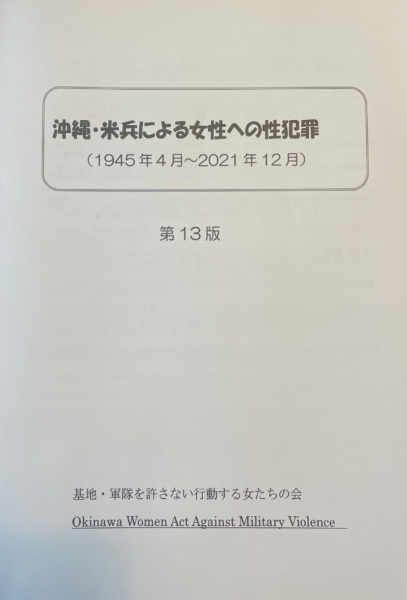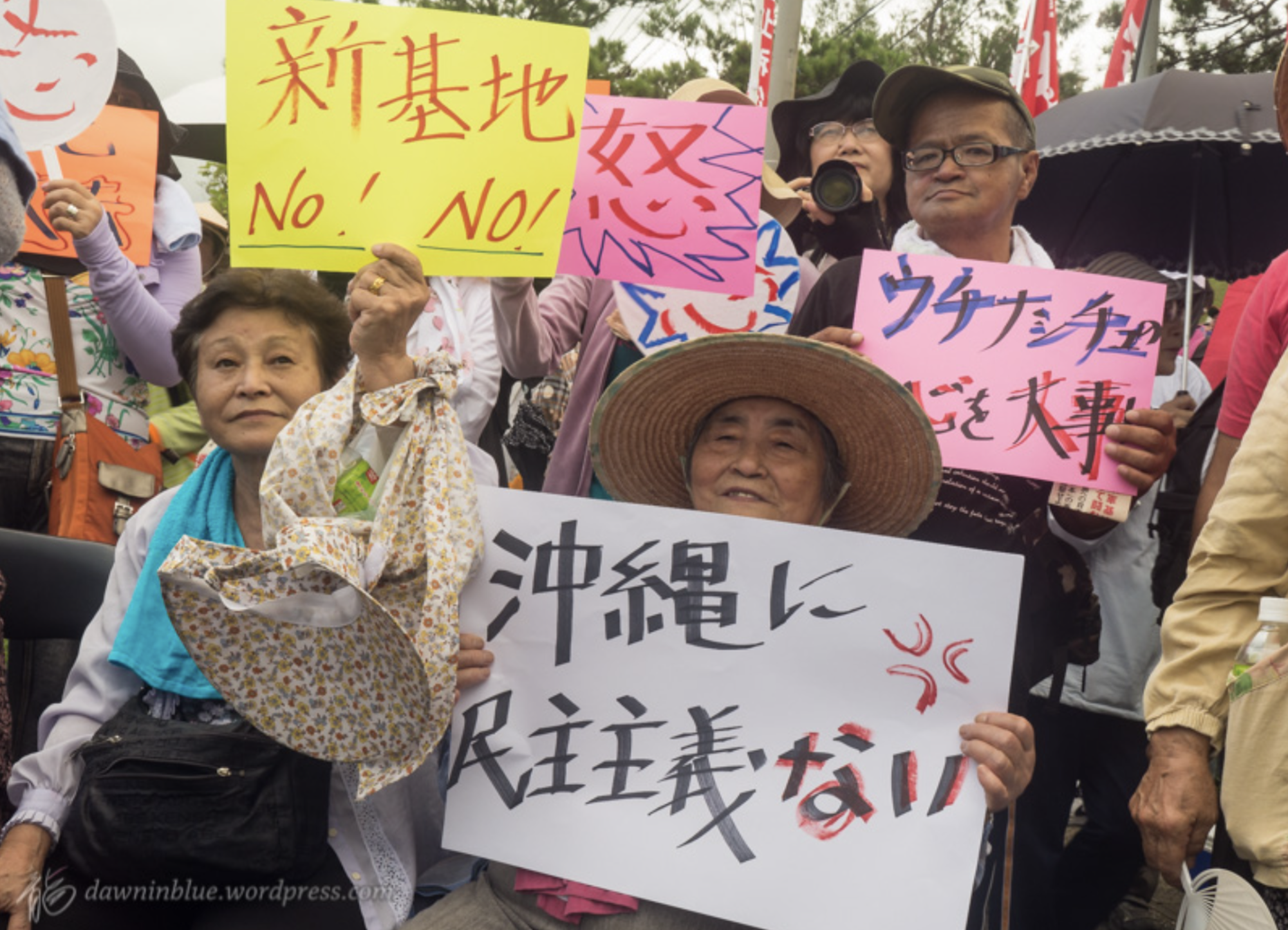At 4 p.m. on August 10 of this year, 1,600 people of Okinawa held a protest opposing the presence of U.S. military bases in Okinawa Prefecture. Tensions between locals and U.S. military bases have continued to worsen due to multiple cases of Okinawan women being sexually assaulted by U.S. military servicemen. People in Okinawa and across the country are outraged by these cases, which are always hidden in the dark and dismissed without justice being served.

Author: Harumi Miyagi A booklet that covers the history of Okinawan women suffering from sexual assaults committed by US military members. Published by Women’s Action Against Military Bases and Military reached its 13th edition last year.
This issue comes along with a very long history of sexual assaults committed by U.S. military personnel in Okinawa. An Okinawan women’s civic group called Okinawan Women Act Against Military Violence and Harumi Miyagi, a researcher of the history of Okinawan women, have been working together to document the sex crimes committed by U.S. soldiers. They discovered 350 crime records dating back before the Battle of Okinawa which ended in June 1945. Hundreds of Okinawan girls and women who suffered from these horrific incidents didn’t have access to fair court trials when Okinawa was under U.S. control. However, when Okinawa was returned to Japan in 1972, women had access to court trials, but justice was still hindered.
On January 19, 1960, Japan and the United States signed the Japan-US Status of Forces Agreement, which is more favorable to the US military, and is one of the core reasons why women are prevented from receiving fair court trials. The agreement under Article 17 states, “The military authorities of the United States shall have the right to exercise exclusive jurisdiction over persons subject to the military law of the United States with respect to offenses, including offenses relating to its security, punishable by the law of the United States, but not by the law of Japan” which means that the US military is not obliged to Japanese domestic laws. Japan has no right to enter the bases stationed in its own country. The National Police Agency documents obtained by The Japan-US Status of Forces Agreement reveal that of the 35 US soldiers arrested for assaults on Okinawan women since 1996, more than 80% were not arrested, and their cases were dealt with without detention. Therefore, it’s difficult to get anything resolved when a US military personnel is accused of a crime since the U.S. has the right to conduct a case exclusively without the involvement of the Japanese authorities— even though the victim may be Japanese.
Many of these rape cases were not openly discussed in the media and public; however, in early September of 1995, an Okinawan elementary schoolgirl in Kin Village of Okinawa was raped and beaten by three U.S. servicemen. The horrific incident provoked outrage in Okinawa and across Japan resulting in protests, media attention, and conferences being held on the topic about the safety of residents coexisting with U.S. military bases. One of the biggest rallies against the U.S. military included about 58,000 people protesting at a park in Ginowan on October 21, 1995. Even though the issue was brought to justice, as the three military service men were handed over to the Japanese authorities, crimes continued occurring. In 2013, two US Navy sailors were indicted for the rape of an Okinawan woman. A few years later, another massive protest occurred in 2017 when a US army worker was charged with the rape and murder of a 20-year-old woman.
The most recent case took place on December 24, 2023, when a US Air Force airman kidnapped and raped an Okinawan girl who was under 16 years old. People across the country were disgusted and horrified by the crime, but also concerned about how the Japanese Government handled the case.
According to the prefecture’s base countermeasures division, when a U.S. soldier commits a crime, the Okinawa Defense Bureau is often contacted on the same day or the day after the police and other authorities respond. However, for the case in 2023, the Okinawa Prefectural Police sent the case to prosecutors on March 11, and the Naha District Public Prosecutors Office indicted the soldier on March 27 for abduction for sexual purposes and non-consensual intercourse. Yet, the news was only released on June 25. The delay of this news concerned people as the prefectural election, focused heavily on the relocation of the US Marine Corps Futenma Air Station to Nago City, took place on June 16. Having a case involving a US soldier may have had a huge impact on the results of the election. In this instance, the perpetrator was indicted and handed to the Japanese authorities. However, the case has raised concerns about the Japanese Government prioritizing their political affairs over their own citizens’ safety.
Women in Okinawa have been overlooked for decades. They are tired of hearing the same promises made by both the Japanese government and US military bases that they will ensure that something like this will never happen again.
Ineffective solutions such as implementing curfews for military personnel have done nothing to solve this issue, as it has been a persistent pattern for more than a number of years. In an interview with Tokyo Shimbun, Professor Maedamari Hiromori of Okinawa International University, who specializes in the Japan-U.S. Security Treaty, stated, “As long as the Japan-U.S. Security Treaty and U.S. military bases exist, criminal acts by U.S. soldiers will not end. This is a chronic problem. With the current administration, there is no way to say anything to the U.S. It is also uncertain whether we can prevent a recurrence.”
Even though there are no solutions in the near future, Okinawans are continuing to fight for justice.




















